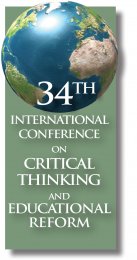34th International Conference on Critical Thinking
The world's longest running conference on critical thinking...
Featuring at this year's conference
Bertrand Russell Scholar
Ralph Nader
Conference theme: Critical Thinking - Essential to the Public Citizen: Fostering Critical Thinking in Education Throughout the World
Berkeley, CA
July 26 - 31, 2014
Preconference: July 26 - 27, 2014
$510.00
Additional Information About:
34th International Conference on Critical Thinking
Together, the Center and Foundation for Critical Thinking have hosted critical thinking academies and conferences for almost 35 years.
During that time we've played a key role in defining, structuring, assessing, improving and advancing the principles and best practices of fairminded critical thought in education, as well as in society. Our annual conference provides a unique opportunity for you to improve your understanding of critical thinking, as well as your ability to substantively foster it in the classroom and in all aspects of your work and life.
The conference begins with two options for preconference sessions. The rest of the conference will consist of approximately 30 sessions offered over four days. When you register for the conference, you will choose your pre conference and focal sessions for the main conference. On the third day of the conference you will choose from approximately 25 concurrent sessions. (The full concurrent session program will be available at the conference). Many of the sessions will be posted online in advance.
Throughout our work we emphasize the importance of fostering a substantive conception of critical thinking. Such a conception not only highlights the qualities of the educated person, but also implies the proper design of the educational process. There are essential, minimal conditions for cultivating educated minds. These entail modes of instruction that foster development of the standards, abilities, and traits of the educated person.
When students are taught using a substantive concept of education as the guide to the design of instruction, they learn to initiate, analyze, and evaluate their own thinking and the thinking of others (within all the content areas they study). Doing so, they come to act more reasonably and effectively in every part of life. They are able to do this because they have acquired intellectual tools and intellectual standards essential to sound reasoning and personal and professional judgment. Self-assessment becomes an integral part of their lives. They are able to master content in diverse disciplines. They become proficient readers, writers, speakers, and listeners. They use their learning to raise the quality of their lives and the lives of others. They become reasonable and fairminded persons capable of empathizing with views with which they disagree and disagreeing with views uncritically accepted by those around them. They are able to use their reasoning skills to contribute to their own emotional life, and to transform their desires and motivations accordingly. They come to think, feel, and act effectively and with integrity.
All conference sessions are designed to converge on basic critical thinking principles and to enrich a core concept of critical thinking with practical teaching and learning strategies.
